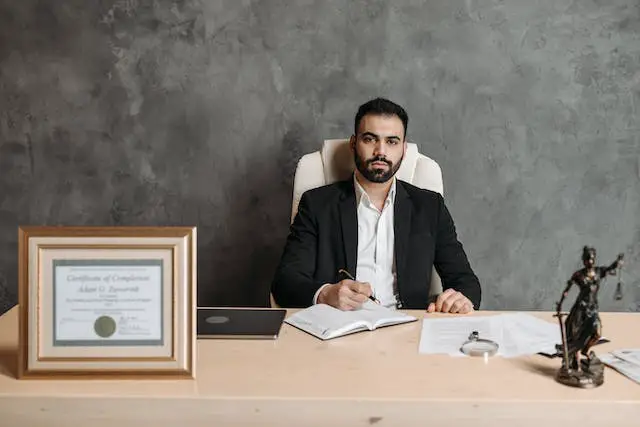
Do Opposing Lawyers Talk to Each Other? | Insights and Information
The contents of this web page are for informational and educational purposes only, and nothing you read is intended to be legal advice. Please review our disclaimer before taking action based upon anything you read or see.
The straightforward answer is yes; opposing lawyers talk to each other. Proper communication is essential to every profession, including the legal field.
And despite the complexities involved, all lawyers, including those in opposition, are bound by oath to uphold justice. And for this to be carried out efficiently, the opposing lawyers must talk to each other. And if you desire to know more, this post will enlighten you greatly.
Furthermore, despite having different views regarding a case, opposing lawyers are still under the obligation to talk to each other. They also speak with other attorneys and legal counsels of the opposing side. This helps make the court proceedings efficient and fair. Come along as we elaborate more on this below.
Benefits of Communication between Opposing Lawyers

As earlier highlighted, communication between opposing lawyers is essential. In the sections below, we will elaborate on the essence of communication between opposing lawyers. This goes thus:
1. Effective negotiation
The first benefit of communication between opposing lawyers is effective negotiation. While representing their respective clients, opposing lawyers usually handle diverse legal activities such as plea bargains and other types of negotiations.
And this is only possible when the lawyers on both sides talk to each other. Through proper communication, lawyers can further deliberate on suitable outcomes for a case. And in all, this must be handled respectfully and concisely.
2. Establishing relationships in the legal field
communication between opposing lawyers also establishes relationships in the legal field. This helps to ensure the effective dispersion of justice. Attorneys also work with those on other parties. However, with effective communication, both parties can find common ground and ensure their clients’ rights are intact.
3. Concise flow of arguments
In the field of law, the flow of concise arguments is essential. This helps legal experts to convince the juries and judges in the courtroom. In the process of argument, lawyers in the opposing sections usually learn from each other and share facts and other essential details regarding a case. This further works to ensure the smooth handling of every case.
4. Supporting professional sanity
When opposing lawyers communicate with each other, they usually work in unity to support professional sanity both in and out of the courtroom. All attorneys must speak to each other respectfully and ethically. This is necessary, even if they are representing different clients. Furthermore, lawyers must avoid disrespecting their colleagues when discussing with each other. This will help to maintain the respect that’s due to the law field.
5. Preventing litigation
The litigation process usually has some demerits, such as time wastage, stress, and huge financial commitments. Thus, communication between opposing lawyers goes a long way in preventing avoidable litigation. This is valid, as it allows lawyers to engage in helpful and productive dialogue and dispute resolution alternatives. In all, the outcome will protect the interests of all parties involved.
6. Facilitating the trial processes in court
Proper communication between opposing lawyers also goes a long way in facilitating the trial processes in court. This entails transmitting data and other relevant evidence between clients and lead counsels. Lawyers also need to communicate ethically to make the trial proceedings flow effectively. In the end, there will be a fair trial if the communication process is flowing properly.
7. Creating trust in the legal field
Trust is an essential factor in the legal field. And proper communication among opposing lawyers helps to support this degree of trust. This communication further encourages collaboration among lawyers. And in the eyes of the public, this communicates unity and upliftment of justice in the legal field.
Courtroom Etiquette for Opposing Lawyers

In addition to proper communication among opposing lawyers, other courtroom etiquette must be adhered to. This includes:
I. Respect for all occupants of the courtroom
Lawyers must respect all occupants of the courtroom while avoiding any form of verbal attacks. Their major focus should also be on the current case instead of opting for wrong approaches in the courtroom.
II. Proper use of non-verbal communication patterns
The proper use of non-verbal communication patterns in the courtroom is also essential. This includes eye contact and body language. Thus, every lawyer must ensure proper eye contact with the jury and judge. This will communicate sincerity and confidence on the part of the lawyer.
III. Good dress sense
Another courtroom etiquette for lawyers entails having a good sense of dress. Every opposing lawyer must opt for a proper dress that connotes the professionalism involved in the legal field. Casual wear, as well as unprofessional hairstyles, should also be avoided.
My Opinion
Communication among opposing lawyers must be emphasized. Thus, it’s best to adhere to the rules as highlighted above. Furthermore, good courtroom etiquette and communication are also essential. This will help to uphold the dignity of the legal profession, among other merits, as highlighted above.
References
- Texas Board of Legal Specialization (TBLS): https://www.tbls.org/
- Sobowale, J.; Becoming an in-house lawyer: https://www.cba.org/Publications-Resources/CBA-Practice-Link/Young-Lawyers/2015/Becoming-an-in-house-lawyer

I’m a driven and accomplished law graduate and post-graduate, passionate about sharing my legal expertise via my blog. I hold a Bachelor’s degree in Law from the University of London (UK) and a Master’s in Law from the University of Derby (UK). Both gave me the foundational knowledge and skills to excel in my chosen career path.
Throughout my academic journey, I have gained extensive knowledge in various fields of Law, including Corporate and Business Law in the USA, Criminal Law, International Law, US Copyright law, and most importantly, American Constitutional law.


Comments are closed.